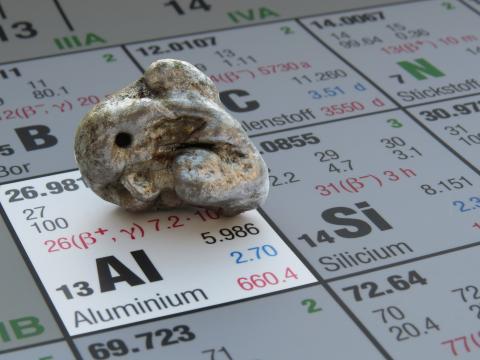Aluminum
What is aluminum?
Aluminum is a naturally occurring metal. It is the most common metal found in the earth’s crust.
As a metal, aluminum is used in many everyday products like soda cans, pots and pans, and cooking foil. As a powder, aluminum can be mixed with other metals to form alloys. These alloys are used in products like antacids, food additives, cosmetics, and deodorants. Some public water systems add alum - an aluminum alloy - to improve water clarity.
How can I be exposed to aluminum?
People are exposed to low levels of aluminum everyday from air, drinking water, and food.
Some people may be exposed to higher levels of aluminum through air if they work in places that make or use products with aluminum.
Aluminum is naturally present in Wisconsin's groundwater. Some areas may naturally have high levels of aluminum.
Aluminum is naturally found in many foods at low levels. People can be exposed to higher levels of aluminum by eating products that contain aluminum additives and by cooking acidic foods in aluminum pots.
How can aluminum affect my health?
Studies in research animals have shown that high levels of aluminum can affect reproduction, brain chemistry, and kidney function.
How can I protect myself and my family from aluminum?
People who work in a place where aluminum that make or use aluminum products:
Read and follow instructions provided by your employer. Wear all required personal protective equipment (such as gloves, masks, coveralls, and respirators). Shower or change clothes before leaving work to avoid bringing chemicals home with you. If this is not possible, change as soon as you get home and wash your work clothes separately from the rest of you and your family’s laundry.
Private well users should test for aluminum at least once.
- It is best to test using a Wisconsin certified lab.
- Households with pregnant people and young children may be eligible for free testing through their local health department.
Well users should take action if the aluminum level is equal to or greater than 200 micrograms per liter (µg/L).
- Retest your well to verify to results.
If the aluminum level is still high:
- Everyone should use a different source of water for drinking and preparing foods that take up a lot of water (like rice, oatmeal, and gelatin).
- Options include bottled water, water from a well without issues, and water from a public system without violations.
- It is ok to use the water for bathing, brushing teething, and washing dishes.
- Find a long-term solution. Options include installing a certified treatment device and drilling a new well.
Avoid eating large amounts of processed food containing aluminum additives.
Do not cook acidic foods in aluminum pots frequently.
Limit intake of aluminum-containing antacids and buffered aspirin. Kept these (and all medications) out of reach of children.
Who regulates aluminum in Wisconsin?
The Department of Natural Resources regulates how much aluminum can be released into the air and groundwater in Wisconsin.
The Department of Natural Resources also regulates how much aluminum can be in water served by public water systems and oversees the clean up of contaminated sites.
Related topics
Our groundwater standards page has information on how Wisconsin's groundwater standards are set, the Department of Health Services' role in the process, and a summary of the current and recommended standards including aluminum.
The Agency for Toxic Substances and Disease Registry's ToxFAQs page has more information on aluminum exposure routes and health effects.

